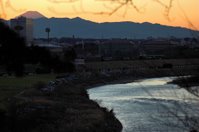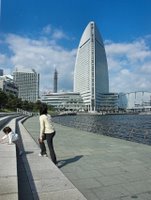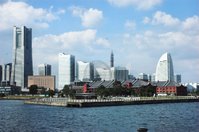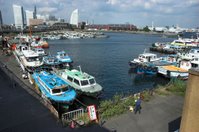Autumn isn't a real autumn in the Tokyo area, certainly not like a New England, Mid-Atlantic, Northern Mid-West, or Northwestern autumn in the US. It actually reminds me of northwestern Texas where once it gets below about 75 degrees, people start wearing jackets and complaining of cold. So it can be confusing knowing that it is supposed to be autumn but with weather similar to May or early June.
The key sign that autumn is finally here though is
snot. Yes, snot. Runny noses, colds, flus. And the repeated constant sniffling without ever using a tissue or handkerchief. Hands, fingers, or even sleeves are fine, but one must refrain from blowing ones nose. As it was explained to me, this is because you'd just have to do it blow it again if you did so. I wonder what people do when they have diarrhea here. Go to the toilet? Wipe? Why, you'd just have to do it again.
Of course with sniffling and colds come coughs and sneezes. Commonly, open, uncovered coughs and sneezes. Cough in peoples face, sneeze in their face. Covering your mouth is polite, but in a crowded train, restaurant, or other public place, it's not really a necessity. Why do you need to be polite to strangers whom you have no personal interaction with? This is Japan. And everyone knows that stifling a sneeze is unhealthy. It is better to let it all blow out full-blast all over everyone and everything in the area.
The constant sniffling can drive non-Japanese nuts. It really gets on ones nerves. I often see that people have done Google searches for things like "How to stop her from sniffling all day" and land here. Wish I knew how, but in Japan it is something that you have to endure. It is a constant sound. Not just once a second or so, but more likely 2-3 times a second all damned day without relief. Imagine a train or office full of people doing that. Offer a tissue? Doesn't work. Punch in the nose? Tempting, but would land you in jail and reinforce the stereotype of non-Japanese as dangerous violent criminal thugs.
Men sniffle like little girls too, but often there are very deep loud sorting, snot-sucking breaks in the sniffling. In the train, at lunch, anywhere and everywhere is fine. Hacking a big goober can be an added accompaniment. I even see actors on TV do this snot-sucking to reinforce their masculine coolness. (
Kimtaku, for example, does it occasionally in roles.)
Was down at a nearby 7-11 yesterday. (Setagayaku, Higashi-tamagawa 1 chome 27). A young clerk wearing black-framed glasses was stocking food and openly sneezing right on the products. Showed no embarrassment nor signs that anything at all was unusual. A little spit and snot and virus to go with your vitamin c? Then this morning I went to the same store, the female clerk was doing her sniffling-without-pause performance. I hated to let her touch anything that I was buying, but since I was getting bleach, I figured I would take the risk. At least she didn't do like the Denenchofu Precce (Tokyu) grocery store clerk a few months ago who wiped her nose with her hand and then used the same still snotty hand to give me my change.
It's Shinto, you know. Cleanliness. Purity. Japan is the cleanest country on earth. Just ask
nihonjinron fundalmentalists.








